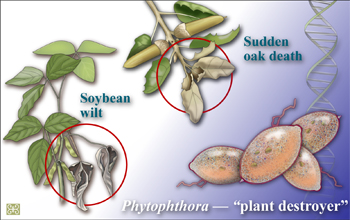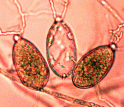|

Press Release 06-125
Genome Info from "Plant Destroyers" Could Save Trees, Beans and Chocolate

Rapidly evolving genes encode substances that may debilitate plants
August 31, 2006
An international team of scientists has published the first two genome sequences from a destructive group of plant pathogens called Phytophthora--a name that literally means "plant destroyer." The more than 80 species of fungus-like Phytophthora (pronounced "fy-TOFF-thor-uh") attack a broad range of plants and together cost the agriculture, forestry and nursery industries hundreds of billions of dollars each year.
Even though Phytophthora are similar to fungi, most fungicides are ineffective at controlling them. The information gained from studying the genomic sequences of P. ramorum and P. sojae will help scientists devise strategies to combat not only these two species, but also other disease-causing Phytophthora.
The study appears in the Sept. 1 issue of the journal Science.
Phytophthora sojae, an endemic pathogen of soybeans, is responsible for $1 billion to $2 billion in losses worldwide each year. Phytophthora ramorum is associated with sudden oak death, a disease that has devastated the nursery industry and oak ecosystems in California, Oregon and Washington. More than 1 million native oak and tanoak trees have been lost to the disease.
In addition to soybean and oak, Phytophthora species cause disease in avocado, coconut, papaya, pineapple, potato, strawberry and watermelon, to name a few. The pathogen also destroys an estimated 450,000 tons of cocoa beans with a resulting $400 million loss in chocolate production each year.
The researchers found the pathogens have nearly twice as many genes as other fungal pathogens, and that more than 40 percent of the genes in each of the two species are undergoing rapid change. Many of the rapidly evolving genes encode toxins and other proteins that may debilitate plants.
"We speculate that the rapidly changing genes are being driven to evolve by pressure from the defense systems of the pathogens' host plants," said Virginia Bioinformatics Institute's Brett Tyler, the project's principal investigator.
"The Phytophthoras, in addition to their great economic importance, are fascinating organisms with very distinct and interesting biology," said Maryanna Henkart, NSF's division director for molecular and cellular biosciences, which helped fund the work. "These new genome sequences will contribute to our basic understanding of normal plant-microbe relationships as well as their roles in disease," she said.
The project was funded by the Microbial Genome Sequencing Program--a joint program between USDA's Cooperative State Research, Education and Extension Service and NSF--and also by the Department of Energy's Joint Genome Institute.
-NSF-

Media Contacts
Richard (Randy) Vines, NSF (703) 292-7963 rvines@nsf.gov
Scott Elliot, CSREES - USDA (202) 720-7185 selliott@csrees.usda.gov
Sean Adams, ARS - USDA (301) 504-1617 sean.adams@ars.usda.gov
David Gilbert, DOE JGI (925) 296-5643 DEGilbert@lbl.gov
Program Contacts
Maryanna P. Henkart, NSF (703) 292-8440 mhenkart@nsf.gov
Principal Investigators
Brett Tyler, Virginia Bioinformatics Institute - Virginia Tech (540) 231-7318 bmtyler@vt.edu

The National Science Foundation (NSF) is an independent federal agency that supports fundamental research and education across all fields of science and engineering. In fiscal year (FY) 2009, its budget is $9.5 billion, which includes $3.0 billion provided through the American Recovery and Reinvestment Act. NSF funds reach all 50 states through grants to over 1,900 universities and institutions. Each year, NSF receives about 44,400 competitive requests for funding, and makes over 11,500 new funding awards. NSF also awards over $400 million in professional and service contracts yearly.
 Get News Updates by Email Get News Updates by Email
Useful NSF Web Sites:
NSF Home Page: http://www.nsf.gov
NSF News: http://www.nsf.gov/news/
For the News Media: http://www.nsf.gov/news/newsroom.jsp
Science and Engineering Statistics: http://www.nsf.gov/statistics/
Awards Searches: http://www.nsf.gov/awardsearch/
| 



